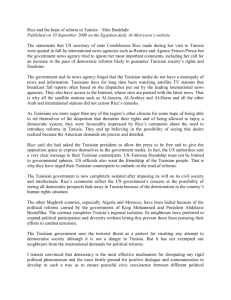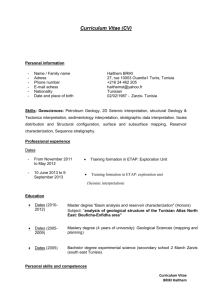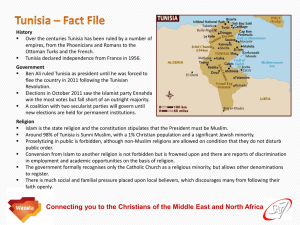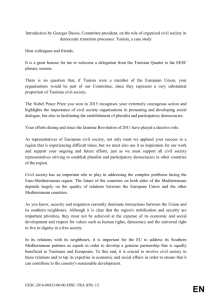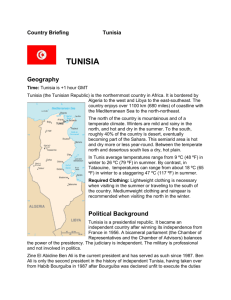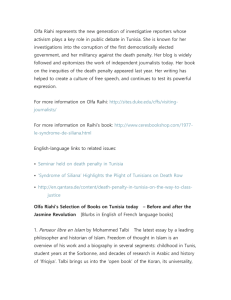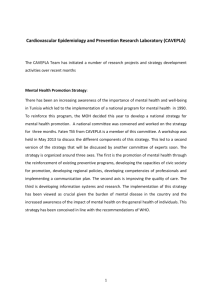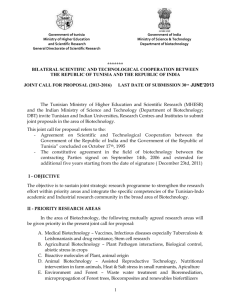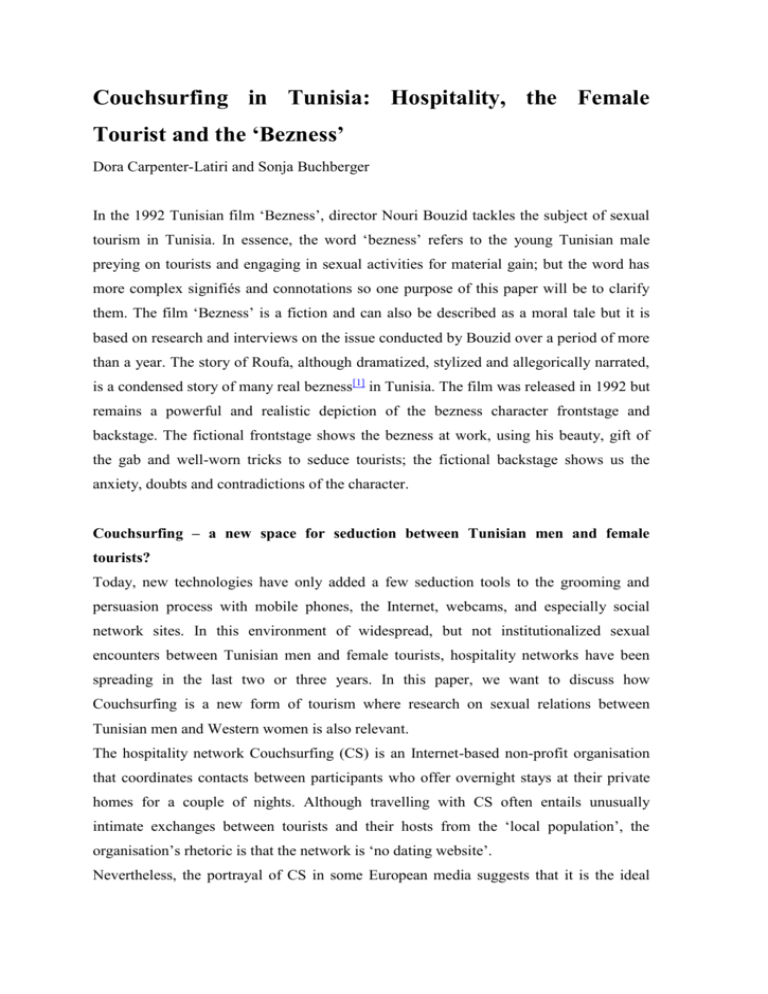
Couchsurfing in Tunisia: Hospitality, the Female
Tourist and the ‘Bezness’
Dora Carpenter-Latiri and Sonja Buchberger
In the 1992 Tunisian film ‘Bezness’, director Nouri Bouzid tackles the subject of sexual
tourism in Tunisia. In essence, the word ‘bezness’ refers to the young Tunisian male
preying on tourists and engaging in sexual activities for material gain; but the word has
more complex signifiés and connotations so one purpose of this paper will be to clarify
them. The film ‘Bezness’ is a fiction and can also be described as a moral tale but it is
based on research and interviews on the issue conducted by Bouzid over a period of more
than a year. The story of Roufa, although dramatized, stylized and allegorically narrated,
is a condensed story of many real bezness[1] in Tunisia. The film was released in 1992 but
remains a powerful and realistic depiction of the bezness character frontstage and
backstage. The fictional frontstage shows the bezness at work, using his beauty, gift of
the gab and well-worn tricks to seduce tourists; the fictional backstage shows us the
anxiety, doubts and contradictions of the character.
Couchsurfing – a new space for seduction between Tunisian men and female
tourists?
Today, new technologies have only added a few seduction tools to the grooming and
persuasion process with mobile phones, the Internet, webcams, and especially social
network sites. In this environment of widespread, but not institutionalized sexual
encounters between Tunisian men and female tourists, hospitality networks have been
spreading in the last two or three years. In this paper, we want to discuss how
Couchsurfing is a new form of tourism where research on sexual relations between
Tunisian men and Western women is also relevant.
The hospitality network Couchsurfing (CS) is an Internet-based non-profit organisation
that coordinates contacts between participants who offer overnight stays at their private
homes for a couple of nights. Although travelling with CS often entails unusually
intimate exchanges between tourists and their hosts from the ‘local population’, the
organisation’s rhetoric is that the network is ‘no dating website’.
Nevertheless, the portrayal of CS in some European media suggests that it is the ideal
way to have a ‘summer flirt’ when on holiday, as seen in an explicit picture in the
German woman’s magazine JOY.[2] It shows a woman sitting on a couch. On her right
and left are two attractive men, one fair-haired, the other one with much darker hair. The
female Couchsurfer is portrayed in a very dominant way: she seems to be slightly older
than the men, sitting in the middle, in the centre of the picture, with her feet on their
limbs. She is smiling whilst she caresses the hair of both of them; the sexual subtext
shows her in a position of control, transgressing the taboo of having more than one
partner at a time, suggesting another transgression – of sexual relations with younger men
– and enjoying it.
There are currently more than 2,500 official members in Tunisia; however, the number of
people who are actively involved in CS activities is much smaller. The most active
members who organize regular offline meetings in cafés or in the form of day trips are
largely familiar with each other from these offline interactions. In terms of social
background, most Tunisian members come from prosperous or moderately prosperous
families. In spite of their good jobs, several members say they would like to move abroad
if they got the chance to do so, but they also stress that they are not under the illusion that
‘Europe is paradise’. Most members hold a university degree or are still studying. They
speak several foreign languages. Hardly anyone is married yet and most are still living
with their parents. In terms of gender and age, the overall majority of 70% are male and
more than 70% are in their 20’s.[3]
In our fieldwork in Tunisia in 2009, we aimed at exploring the encounters between
Couchsurfers. Our data is based on our participant observation of CS activities, including
regular meet-ups, hosting and being hosted, an analysis of different thematic forums on
the CS website, and informal conversations and interviews with members. We collected
information on sexual activities in CS in a variety of ways: in some cases Tunisian men
were quite open when talking about their relationships, especially when they lasted
longer and took the form of accounts about ‘how they got to know their girlfriend’. Also
gossip among Tunisian members allowed for important insights into discourses on sexual
relations in CS and showed that most male members are very aware of their reputation as
‘womanizers’. Foreign women were sometimes eager to discuss with us their experiences
with their Tunisian hosts, sometimes seeking ‘advice’ from our side. Another source of
information for us was auto-ethnography, i.e. the attempts of some members to approach
us during our participant observation when being hosted. Another way of noticing the
attention a female western couchsurfer (CSer) would attract was through what CS
categorizes as ‘spam’, i.e. copy-pasted messages from Tunisian members as soon as we
(as a female western CSer) logged on to our account and appeared as a ‘travelling CSers
in the area’ on people’s profiles.
Several male CSers had sexual relationships with foreign women, which sometimes led
the women to return to Tunisia and even to get engaged to the men. In some cases
Tunisians travelled to Europe to visit their foreign ‘girlfriends’. There have also been
several cases of female guests complaining about being approached by their Tunisian
hosts and resenting having to reject their advances.
Male Tunisian CSers define themselves in opposition to the ‘bezness’. Their
representation of the bezness is the most negative one, considering that bezness can also
mean a man who chats up women in the broadest sense. Before joining CS nearly all
Tunisian members had already tried to get in touch with foreigners through other means
(other websites, mainly Facebook, or through chatting to tourists on the streets). Whereas
some actively bring up the issue of bezness in Tunisia to warn their ‘guests’ about ‘illintentioned’ Tunisian men, others feel uneasy about it in general and try to avoid any
discussion of it.
A Tunisian CSer in the company of a foreign woman might be completely ‘innocent’ of
any sort of bezness intention, but the assumption from the outside world would be that he
is seeking either sex or economic gain. Other Tunisians identify male CSers with
bezness, which poses a problem when showing foreigners around. Reactions by other
Tunisians make it more than clear what their interpretation of the situation is: Some smile
and congratulate the Tunisian CSers, saying allāh ysahhil calīk - ‘may God make it easy
for you’ (to get away from this country). It happens that others refer to the female CSer in
their company as “your papers/visa” (al-awrāq imtācik).
In his pioneering study on sexual relations between young Arab men and female tourists
in Israel in the 1960’s, Eric Cohen describes how these relations can offer a way out of
different dilemmas and social pressures in the lives of the men involved.[4] In a similar
way it frequently came up in our conversations with Tunisian Couchsurfers that they
associate contact with foreigners with freedom. They describe relationships with foreign
women as a way out of pressure to conform in Tunisian society. In extreme cases this can
lead people to have two or more Facebook accounts: one for Tunisian friends and a
separate one for foreign ones, where they feel they can express themselves more freely
than in front of all their Tunisian Facebook contacts. A few members were open about
their preference for a ‘Western’ woman as a future wife, arguing that Western in-laws
would not intervene in their marriage so much. Foreign women are also preferred for
their allegedly less materialistic outlook on life - in comparison with Tunisian girls and
women, for whom social status and the financial situation to which it is often connected
is said to be most important in their choice of partner. The fact that ‘Western’ CSers
coming to Tunisia are often hippie-style backpackers in their 20’s reinforces this image
of Westerners. People who voluntarily gave up their jobs before their ‘round the world’
travel or who sold all their belongings and became ‘drifters’ made a considerable
impression on Tunisian members, who still talked about them long after they had left the
country.
Foreign women could be puzzled by doubts about the ‘real’ intentions of their hosts.
Incidents like being called ‘sweetie’ in emails from Tunisians even before their first faceto-face meeting contribute to irritation and speculation about ‘cultural differences’ in
female-male relationships. The CS website and its many forums offer the opportunity to
exchange views with more people with travel experience in Tunisia. They can confront
their experiences and discuss the character of their engagements with Tunisian people.
The discussions mainly focus on issues of ‘sexual harassment’. Interestingly their
encounters with male members are only rarely discussed in the framework of seduction
or romance. Some comments about the frequent sexual advances by Tunisian male hosts
regret that they have not understood ‘the idea of the couch’ or the ‘CS spirit’, which is
officially clear of sexual intentions, although sexual encounters do take place in Tunisia
and elsewhere.
In other countries, sexual relations between Couchsurfers seem to be relatively frequent,
but they are often treated in a more relaxed way. In the Viennese CS community, for
example, it is seen as quite common that CS host and guest attend a CS meet-up in a pub
together. If the guest gets interested in, or attracted to another CSer, they can change the
host for the next night quite quickly – without their previous host taking it in a bad way.[5]
Considering this liberal atmosphere regarding sexual relations, some discussions on the
forums about Tunisian or Arab members and their sexual advances may come as a
surprise. In the latter case, the discourse is sometimes that Arabs have not understood the
‘idea of the couch’. The issue is thereby dealt with as a problem of cultural
misunderstanding rather than a case of double-standard. Tunisians are presented as
having to go through further intercultural learning processes until they can obtain the
‘real CS spirit’. This point needs further deconstructing and analysis, it also needs to be
compared and contrasted with other negative stereotyping of Arabs in bezness stories.
Deconstructing the Tunisian bezness through discourse and representations
Nouri Bouzid’s film ‘Bezness’ portrays its protagonist Roufa as a predatory bezness
selling the dream of the Orient in exchange for the dream of Europe. In the director’s
depiction of the Tunisian Bezness, there a few transferable features to the archetype of
the bezness as it emerges through our own research: we will stress the features that are
still relevant today whilst taking a more nuanced view of others. In the following short
list we will try to summarize the main features that characterize the bezness. We have
used a Canadian research paper[6] on sexual tourism published in 2001; narratives
collected from the web; but also informal observations and conversations in Tunisia
gathered and recalled since the 70s. We have also used the pioneering work on Tunisian
male sexuality by Fakhreddine Haffani, published in 2005.[7] Usages of the word as they
occur in discourse have helped us define its referent more clearly.
What appears is that the word bezness is polysemic and encapsulates a wide range of
behaviours:
The bezness is after sex with tourists but – as shown on Haffani’s survey about
Tunisian men and sex – is often very traditional and conservative with regards to
the position of the woman in Tunisian society.[8]
Many bezness are after gifts, money, a ticket to Europe, a ‘mariage gris’, etc. but
not all. The newly created lexical compound ‘mariage gris’ is found in association
with the semantic field of ‘bezness’ in French: France and French-speaking
countries are often destinations of choice for the Tunisian bezness. The expression
was used frequently in a French television programme[9] and in the following
forums dealing with Tunisian bezness and their French victims[10]. The lexical
compound is built on the model of ‘mariage blanc’ which refers to fake marriages
for the purpose of residency papers, citizenship, etc. In a ‘mariage blanc’, both
parties know that the marriage is for the papers only, and the norm is that the
marriage is not consummated. ‘Mariage gris’ is a recent usage to define a
marriage situation where one will be truly in love whilst the other only pretends to
be but is pursuing his/her interests. The ‘mariage gris’ is both a real and a fake
marriage, and the adjective ‘gris’ (grey) as a mixture of black and white reflects
this confusion. As in the case of the Tunisian bezness, the expression is usually
applied to situations where a young man from a poorer country will marry a
Western (often older) woman; the Western woman will be in love and believe that
she is loved in return, whereas the husband enters the marriage only for obtaining
residency papers, citizenship, etc.[11]
Some bezness will exchange sex for money.
Some bezness are seeking sex with tourists for the experience of it, for example
for recreational purposes as holidaying tourists are more open about it than
Tunisian women.
Some bezness do want a romantic involvement with a Western woman, these
bezness will claim that Tunisian women are not interested in love but in status,
money etc.
The bezness performs ‘active’[12] penetrative sex with women and sometimes with
men; there are other words used in Tunisian Arabic for the ‘passive’ gay. (We are
currently researching this lexical field and the broader lexis of masculinity in
Tunisia.)
The bezness preys on female and sometimes male tourists.
Many bezness work in the tourist industry at all levels.
Many bezness come from a modest and traditional Muslim background. (As
shown in Nouri Bouzid’s film)
Most bezness have finished secondary school.[13]
This list summarizes the many denotations of the word ’bezness’ and explains why the
word ‘bezness’ is difficult to translate exactly as any particular translation would
highlight one specific behaviour only; the title of the film has remained ‘Bezness’ in the
dubbed and translated versions. Amongst the different words used to translate the
Tunisian Arabic word ‘bezness’ either in English or in French, apart form the word
‘gigolo’, there is also the French word ‘dragueur’ itself undertranslated with the English
‘womaniser’. Robert Lang, in his excellent article on the film[14], uses the expression ‘sex
hustler’ which emphasizes both features of money swindling and prostitution. This last
translation would be suitable for the character of the film but not transferable to all the
incarnations of the Tunisian bezness.
In the film, the bezness central character is an adult male, Roufa, and the film describes
his sexual transactions and endeavours with male and female western tourists as well as
his torments as the psychological consequences of the commodification of his body
emerge. Roufa is a ‘bezness’ and he defines this as his job. It is his ‘work’ as a bezness
that allows Roufa to provide for his family. In an interview[15] following the opening of
the film, the director Nouri Bouzid introduces the concept of the ‘bezness’ with the word
‘gigolo’, also used in French. In that interview, both Nouri Bouzid and the journalist
revert to the word ‘bezness’ and indirectly underline that the exact meaning and referent
of the word in the Tunisian context is different from the one involved by the word
‘gigolo’. The connotation of the word ‘gigolo’ is negative, whilst the character
constructed by Bouzid is complex and allegoric of Tunisia. Nouri Bouzid in his film
highlights the inner torments, limitations and contradictions of the bezness, as a metaphor
for Tunisia and its ambivalent needs for the tourist industry. At the same time, the film
depicts an irresistible seducer who can ‘have’ all the western tourists he wants. Indeed, no
western woman in the film seems able to resist his charms if he sets his mind to it, and it
is he who is pulling away from the older western men attracted to him. The bezness
character in the film is defined in contrast with other male western characters, and the
Tunisian bezness attributes are his dark looks, his verbal seduction and his ability to
perform ‘active sex’ almost indiscriminately. This representation in the film highlights an
element of vindictive superiority towards the West and might give us some clue to the
persistence of positive connotations around the word in the Tunisian context. Although
the film character elaborates on the emerging vulnerabilities of the bezness, these
vulnerabilities are related to his ageing, and to what we can summarize as his existential
doubts, both connected. Indeed in spite of all his failures, the Tunisian bezness – in the
film and in Tunisian discourse – seems to remain a representative of a masculinity for
which the West would be found wanting. This construct reflects an occidentalist fantasy,
which is deeply intertwined with the corresponding orientalist fantasy constructed by the
Western tourist in her/his quest for a local sexual experience. The film elaborates on the
bezness’ talent for providing what the Western female[16] tourist wants: an Arabian night
fantasy with sex and romance. Some victim stories in the media and the web also show
that the core techniques of the bezness remain based on the appeal of a post-colonial
orientalist fantasy with the attached myth of the Arab man as both super-masculine AND
super-romantic. In the following quotation, the usage of the expression ‘exotic prince’
and the more colourful language that follows encapsulate the cynical scenario played out
by the bezness as response to the orientalist fantasy:
“Sadly i have had the unfortunate experience of staying in my boyfriends apartment with
4 of his guys mates and ACTUALLY seeing one girl leaving at 8am....and another
arriving half an hour later. A lot of the men, especially the animation workers are pros at
this and have been doing this for a long long time.......the young girls, i fear, are naive and
have NO clue as to what is happening, they think they have found some exotic prince
with a heart of gold but really.....they are being royally F*cked over!”[17]
Researching more broadly the topic of sexual tourism in Tunisia through discourse, it is
the word ‘bezness’ that is most consistently used, we have also found occurrences of the
word ‘bezness’ in a thread dealing with sexual tourism in Egypt[18] on a website about
Egypt. The consistent usage of this Tunisian Arabic neologism stresses the specificity of
what it signifies and the relatively recent awareness of the phenomenon it refers to.
In Tunisian Arabic the word ‘bezness’ can be used in different contexts, it can refer to
dodgy businesses as well as to the sexual transactions/endeavours with Western tourists.
The connotations of the word are not necessarily negative, as young Tunisian males
would use it to refer to themselves playfully when describing their activity of chasing
tourists around the holiday resorts. The word ‘bezness’, as well as the related words
‘beznessa’ ‘bezniss’, ‘tbezniss’ are neologisms; the root word ‘business’ is a borrowing
in French from the English ‘business’. The semantic feature of commercial activity in the
root word is present when the word refers to the ‘bezness’ who makes money from his
activity, but it is absent when the word refers to the activity of chasing tourists for sexual
gratification. The derivation construction follows Tunisian Arabic morphology; many
words in Tunisian Arabic dialect and slang are created through similar patterns. In this
specific example the Arabic morphology puts an emphasis on the active semantic feature
(in the grammatical sense) present in the whole lexical paradigm. Although the bezness
may have sex with men as well as women, what the bezness practises and sells is ‘active’
penetrative sex. Homosexuality is taboo and illegal in Tunisia although male
homosexuality is very common as a transitory initiative sexual phase. Representations of
‘active’ homosexuality, as through the bezness archetype, seem to give it a higher status
as another expression of masculinity, whilst ‘passive’ homosexuality is represented as
shameful.
We have found a number of websites dedicated to warning western female tourists about
the damage Tunisian men might inflict on them; there are also some forums on the web
and the word ‘bezness’ is used consistently alongside ‘loverat’, ‘conman’, and
‘player’[19]. In April 2010, the television programme on France 2 ‘Prise Directe’[20] was
dedicated to the topic and through the story of two middle-aged women warned against
these ‘love stings’ (‘arnaques au sentiments’, ‘escroquerie sentimentale’) and ‘mariage
gris’ in which the bezness pretends to be in love, and then marries his prey before
running away with money, a French passport, even a house in Tunisia. One interesting
reaction following the programme and posted on the forum[21] dedicated to the topic is
that although the programme was about ‘love stings’, the choice of examples of Tunisian
crooks was negative stereotyping of Arab men; another was that the women were sexgreedy ‘cougars’[22] who should have known better. Victims’ stories tell of broken hearts
and dreams but also lost money. Some stories tell how the bezness got his French
citizenship, residency papers/ work permit and then ran away. The broken hearts and
dreams highlight the seduction of the bezness, here in the incarnation of a love-con artist.
The anger and resentment over lost money, lost Tunisian houses, nationality or papers
acquired on false grounds, tell of other grief and frustrations beyond the direct material
loss that would need further research.
Amongst the different words used in association with ‘bezness’, there is the word
‘prostitute’ as well as the word ‘prostitution’. The word is not very common: a Google
search brings up ‘male prostitute’ in the blurb that accompanies Nouri Bouzid’s film, as a
shortcut to translate the Tunisian Arabic title, but there are not many other collocations.
In the forums and websites dealing with the topic, the word ‘prostitute’ is relatively rare,
and when the word is used, it is with precautions, developments, explanations or inverted
commas to justify the usage. In discourse, the connotation of the word prostitution is
perceived as negative and degrading for both the bezness and the female tourist. It
appears that for the female tourist as well as for the bezness there is a resistance to
categorize the exchange as ‘prostitution’ even when there is unambiguous exchange of
money for sexual services.
In www.bezness-land, a French language website dedicated to bezness prevention, the
‘tbezniss’- the activity of the bezness- is named as ‘prostitution in disguise’:
“En fait, les Bezness ne sont ni plus ni moins que des prostitués. Les plus
«gourmands» s’attaquent indifféremment aux hommes et aux femmes.
Maintenant cette forme de prostitution est tellement déguisée, que la justice ne
peut intervenir... faute de preuves suffisantes.”[23]
In the following quotation from a forum dealing with sad stories with these ‘exotic
princes’, a woman is surprised that being given money for sex by a ‘friend’ doesn’t
translate into something ‘like prostitution’. The member of the ‘animation team’
mentioned below is a Tunisian man planning to exchange sex for money:
“one of the animation team was telling me how he was going to stay with his
"friend" from england in another hotel for a few days.. and how she was going to
give him £100, when i pointed out that it was like prostitution he didnt seem to
get it at all, couldnt see anything wrong with it.”[24]
Another website www.tunisia-love.com, also dedicated to bezness prevention, brings in
the word ‘prostitute’ but only to describe a woman who would be doing the job of a
‘bezness’, therefore implicitly stressing the difference between a bezness and a prostitute.
The website defines the bezness essentially as a Tunisian determined to con western
tourist into a marriage for immigration, and stresses that a case of a Tunisian woman
‘beznesser’ would be very rare as generally ‘arabic women shall and can only marry
arabian men’[25]. The issue of exchange of sex for money is mentioned in this website but
without the word ‘prostitution’ under the section ‘Sexual tourism in Tunisia’. This very
broad expression ‘Sexual tourism in Tunisia’ is used as an euphemism, while what can be
objectively defined as an act of prostitution is described ‘a business agreement between
consenting adults’. Interestingly, here the Tunisian euphemism on the root ‘business’ also
used in the specific case of prostitution is reused by the webmasters who want to
denounce it.
“Sex tourism is a business agreement between consenting adults - there is neither
love involved, nor is one of the participiants unaware of the strictly business
character of it.”[26]
What appears through this final point, exploring the contrasted semantics of the bezness
and the prostitute so as to define more clearly the specific semantic features of the
bezness, is that the main feature that would distinguish categorically between a bezness
and a male prostitute is specifically that neither the woman nor the bezness want their
exchange to be perceived as an act of prostitution. The bezness sells the seductive fantasy
of the Arab lover that the tourist wants to buy; in the holiday context, the highly-sexed
Arab may become part of the orientalist fantasy sold with the exotic destination. In
Tunisia there is also the fantasy of the unspoiled beach, of a return to Eden. When the
bezness appears to be ruthless and manipulative, the anger at the bezness shows a strange
disappointment that the soft sands and the clear waters of the beaches do not translate
into innocence from the native.
[
1
]
W
e
w
i
l
l
u
s
e
t
h
e
f
o
r
m
‘
b
e
z
n
e
s
s
’
f
o
r
b
o
t
h
t
h
e
s
i
n
g
u
l
a
r
a
n
d
p
l
u
r
a
l
.
[2]
Hofacker, K. (2009) Der große Internet-Trend Couchsurfing. JOY , 74-82,
http://www.joy.de/liebe/flirten-und-beziehung/a-11412/zu-gast-bei-freunden.html (accessed
on 31 Oct. 2010)
[3]
http://www.couchsurfing.org/statistics.html?country_name=Tunisia (accessed on 31 Oct.
2010)
[4]
Cohen, E. (1971) Arab boys and tourist girls in a mixed Jewish-Arab community.
International Journal of Comparative Sociology, 12(4), 217-233.
[5]
This fieldwork information is based on participant observation at the monthly meetings in
Vienna and conversations with Viennese members in winter 2009/10.
[6]
Lévy, J. et al. (2001) Tourisme et sexualité en Tunisie: Note de recherche. Anthropologie
et Sociétés 25(2), 143-150.
[7]
Haffani, F. (2005) La sexualité des hommes tunisiens.
http://haffani.blogspot.com/2005/07/la-sexualite-des-hommes-tunisiens.html (accessed on 31
Oct. 2010)
[8]
Ibid. and Lévy, J. et al. (2001) Tourisme et sexualité en Tunisie: Note de recherche.
Anthropologie et Sociétés 25(2), 143-150.
[9]
France 2, 27 avril 2010, Prise Directe: Séducteurs, imposteurs, ces escrocs qui nous
fascinent
[10]
http://forums.france2.fr/france2/Prise-Direct/seducteurs-imposteurs-fascinentsujet_89_1.htm (accessed on 31 Oct. 2010)
[11]
Ghorbal, S. (2005) Les jeunes Tunisiens: chouchoutés et encadrés. Jeune Afrique, 2332,
25 Sept., http://www.jeuneafrique.com/Article/LIN25105choucsrdacn0/Actualite-Afrique-chouchoutes-et-encadres.html (accessed on 31 Oct. 2010)
[12]
We use inverted commas here so as not to uncritically reproduce the discourse we want to
highlight and not to leave the unquestioned assumption that there is an ‘active’ and a
‘passive’ participant in sex, here equated with penetration.
[13]
Lévy, J. et al. (2001) Tourisme et sexualité en Tunisie: Note de recherche. Anthropologie
et Sociétés 25(2), 143-150.
[14]
Lang, R. (2007) Sexual Allegories of National Identity in Nouri Bouzid's Bezness (1992).
The Journal of North African Studies 12(3), 309-328.
[15]
http://www.universcine.com/articles/nouri-bouzid-chacun-reve-de-ce-qu-il-n-est-pas
(accessed on 31 Oct. 2010)
[16]
We have chosen to concentrate on the bezness relation with female tourism.
[17]
http://forum.tunisia.com/general-discussion/1390-my-opinion-about-tunisian-men-10.html
(accessed on 31 Oct. 2010) Quotations in the paper come directly from fieldwork or are
directly copy-pasted from the online forums (misspellings are left unchanged).
[18]
Topic: cheating tourist women in Egypt Bezness.
http://www.egyptsearch.com/forums/ultimatebb.cgi?ubb=get_topic;f=3;t=001820 (accessed
on 31 Oct. 2010)
“(M)any of the Tunisian men are referred to as ‘Players’ – they wish! – but most of them
are just second rate gadabouts. And they do ‘prostitute’ themselves by doing what they do –
that’s what you are when you sleep with someone for money.” http://www.tunisialove.com/what-is-bezness-in-tunisia.htm (accessed on 31 Oct. 2010)
[19]
[20]
France 2, 27 April 2010, Prise Directe: Séducteurs, imposteurs, ces escrocs qui nous
fascinent
[21]
The television forum that followed the program triggered heated reactions and brought
further stories, cf: http://forums.france2.fr/france2/Prise-Direct/seducteurs-imposteursfascinent-sujet_89_1.htm (accessed on 31 Oct. 2010)
This English new usage of the word ‘cougar’ to refer to older women preying on younger
men was also used as a French neologism in the forum.
[22]
[23]
http://www.bezness-land.com/qui_sont_il.php (accessed on 31 Oct. 2010)
[24]
http://forum.tunisia.com/general-discussion/1390-my-opinion-about-tunisian-men-10.html
(accessed on 31 Oct. 2010)
[25]
http://www.tunisia-love.com/what-is-bezness-in-tunisia.htm (accessed on 31 Oct. 2010)
[26]
www.tunisia-love.com (accessed on 31 Oct. 2010)

